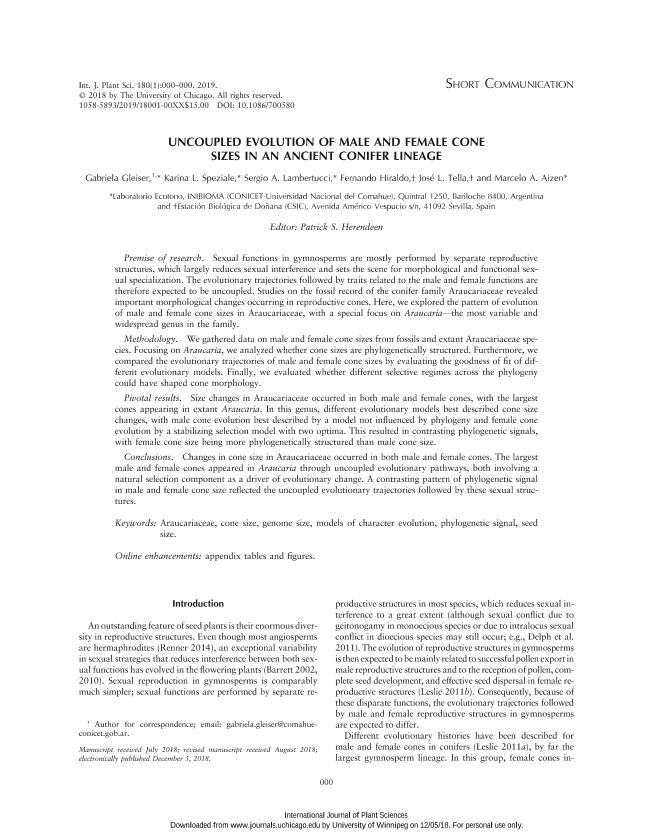Mostrar el registro sencillo del ítem
dc.contributor.author
Gleiser, Gabriela Laura

dc.contributor.author
Speziale, Karina Lilian

dc.contributor.author
Lambertucci, Sergio Agustin

dc.contributor.author
Hiraldo, Fernando

dc.contributor.author
Tella Escobedo, José Luis

dc.contributor.author
Aizen, Marcelo Adrian

dc.date.available
2020-08-20T14:26:06Z
dc.date.issued
2019-01
dc.identifier.citation
Gleiser, Gabriela Laura; Speziale, Karina Lilian; Lambertucci, Sergio Agustin; Hiraldo, Fernando; Tella Escobedo, José Luis; et al.; Uncoupled evolution of male and female cone sizes in an ancient conifer lineage; University of Chicago Press; International Journal of Plant Sciences; 180; 1; 1-2019; 72-80
dc.identifier.issn
1058-5893
dc.identifier.uri
http://hdl.handle.net/11336/111999
dc.description.abstract
Sexual functions in gymnosperms are mostly performed by separate reproductive structures, which largely reduces sexual interference and sets the scene for morphological and functional sexual specialization. The evolutionary trajectories followed by traits related to the male and female functions are therefore expected to be uncoupled. Studies on the fossil record of the conifer family Araucariaceae revealed important morphological changes occurring in reproductive cones. Here, we explored the pattern of evolution of male and female cone sizes in Araucariaceae, with a special focus on Araucaria-the most variable and widespread genus in the family. We gathered data on male and female cone sizes from fossils and extant Araucariaceae species. Focusing on Araucaria, we analyzed whether cone sizes are phylogenetically structured. Furthermore, we compared the evolutionary trajectories of male and female cone sizes by evaluating the goodness of fit of different evolutionary models. Finally, we evaluated whether different selective regimes across the phylogeny could have shaped cone morphology. Size changes in Araucariaceae occurred in both male and female cones, with the largest cones appearing in extant Araucaria. In this genus, different evolutionary models best described cone size changes, with male cone evolution best described by a model not influenced by phylogeny and female cone evolution by a stabilizing selection model with two optima. This resulted in contrasting phylogenetic signals, with female cone size being more phylogenetically structured than male cone size. Changes in cone size in Araucariaceae occurred in both male and female cones. The largest male and female cones appeared in Araucaria through uncoupled evolutionary pathways, both involving a natural selection component as a driver of evolutionary change. A contrasting pattern of phylogenetic signal in male and female cone size reflected the uncoupled evolutionary trajectories followed by these sexual structures.
dc.format
application/pdf
dc.language.iso
eng
dc.publisher
University of Chicago Press

dc.rights
info:eu-repo/semantics/openAccess
dc.rights.uri
https://creativecommons.org/licenses/by-nc-sa/2.5/ar/
dc.subject
ARAUCARIACEAE
dc.subject
CONE SIZE
dc.subject
GENOME SIZE
dc.subject
MODELS OF CHARACTER EVOLUTION
dc.subject
PHYLOGENETIC SIGNAL
dc.subject
SEED SIZE
dc.subject.classification
Ecología

dc.subject.classification
Ciencias Biológicas

dc.subject.classification
CIENCIAS NATURALES Y EXACTAS

dc.title
Uncoupled evolution of male and female cone sizes in an ancient conifer lineage
dc.type
info:eu-repo/semantics/article
dc.type
info:ar-repo/semantics/artículo
dc.type
info:eu-repo/semantics/publishedVersion
dc.date.updated
2020-07-21T21:02:51Z
dc.identifier.eissn
1537-5315
dc.journal.volume
180
dc.journal.number
1
dc.journal.pagination
72-80
dc.journal.pais
Estados Unidos

dc.journal.ciudad
Chicago
dc.description.fil
Fil: Gleiser, Gabriela Laura. Consejo Nacional de Investigaciones Científicas y Técnicas. Centro Científico Tecnológico Conicet - Patagonia Norte. Instituto de Investigaciones en Biodiversidad y Medioambiente. Universidad Nacional del Comahue. Centro Regional Universidad Bariloche. Instituto de Investigaciones en Biodiversidad y Medioambiente; Argentina. Universidad Nacional del Comahue. Centro Regional Universitario Bariloche. Laboratorio de Ecotono; Argentina
dc.description.fil
Fil: Speziale, Karina Lilian. Consejo Nacional de Investigaciones Científicas y Técnicas. Centro Científico Tecnológico Conicet - Patagonia Norte. Instituto de Investigaciones en Biodiversidad y Medioambiente. Universidad Nacional del Comahue. Centro Regional Universidad Bariloche. Instituto de Investigaciones en Biodiversidad y Medioambiente; Argentina. Universidad Nacional del Comahue. Centro Regional Universitario Bariloche. Laboratorio de Ecotono; Argentina
dc.description.fil
Fil: Lambertucci, Sergio Agustin. Consejo Nacional de Investigaciones Científicas y Técnicas. Centro Científico Tecnológico Conicet - Patagonia Norte. Instituto de Investigaciones en Biodiversidad y Medioambiente. Universidad Nacional del Comahue. Centro Regional Universidad Bariloche. Instituto de Investigaciones en Biodiversidad y Medioambiente; Argentina. Universidad Nacional del Comahue. Centro Regional Universitario Bariloche. Laboratorio de Ecotono; Argentina
dc.description.fil
Fil: Hiraldo, Fernando. Consejo Superior de Investigaciones Científicas. Estación Biológica de Doñana; España
dc.description.fil
Fil: Tella Escobedo, José Luis. Consejo Superior de Investigaciones Científicas. Estación Biológica de Doñana; España
dc.description.fil
Fil: Aizen, Marcelo Adrian. Consejo Nacional de Investigaciones Científicas y Técnicas. Centro Científico Tecnológico Conicet - Patagonia Norte. Instituto de Investigaciones en Biodiversidad y Medioambiente. Universidad Nacional del Comahue. Centro Regional Universidad Bariloche. Instituto de Investigaciones en Biodiversidad y Medioambiente; Argentina. Universidad Nacional del Comahue. Centro Regional Universitario Bariloche. Laboratorio de Ecotono; Argentina
dc.journal.title
International Journal of Plant Sciences

dc.relation.alternativeid
info:eu-repo/semantics/altIdentifier/doi/http://dx.doi.org/10.1086/700580
dc.relation.alternativeid
info:eu-repo/semantics/altIdentifier/url/https://www.journals.uchicago.edu/doi/10.1086/700580
Archivos asociados
